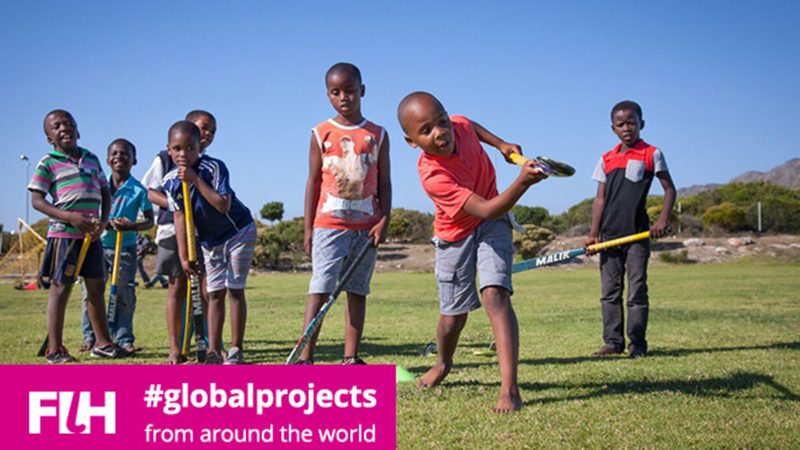
Bringing communities together and fighting racism and prejudice were just some of the aims of the non-profit making organisation Alster Grootbos Foundation when it came into being in 2009.
The Foundation’s aims are implemented through three integrated ‘umbrella’ programmes: 'Green Futures’ which focuses on conservation, ‘Siyakhula’ which focuses on the creation of sustainable livelihoods through enterprise development and ‘Football Foundation’ which focuses on utilising sport for development.
Hockey, with the support of the German Hockey Association (DHB), has been supporting the movement since its inception and the Hockey Foundation has been instrumental in developing social integration, promoting healthy lifestyles, and increasing environmental awareness and life skills amongst communities.
Eight years later and the Foundation is thriving as it operates hockey training camps out of three areas in South Africa – Gansbaai, Stanford and Hermanus – and its team's take part in many tournaments for all ages at different locations around the Cape Town area.
There is one full-time coach employed by the Foundation, plus the services of up to six volunteers. More than 300 youngsters receive hockey training across the three centres.
One of the driving forces behind the Hockey Foundation is Delf Ness, of the DHB and soon to take up position as the Director of Marketing and Communications for FIH. He took time out of his schedule to talk about the work of the Alster Grootbos Foundation and how it has developed over the past few years.
“It has all been very positive. The key changes have been more locations, more volunteers and more funding. We are also getting better equipment to each centre and the relationship between the hockey family in Germany and South Africa is stronger than ever. We are also much better at communication, both internally and externally.”
Taking a more strategic approach to the organisation has been key to its development. “We needed to ensure continuity, so there is a familiarity and understanding among the coaches, volunteers and players but we must also allow the organisation to grow. And that growth must be organic, you can’t force things.
“Every year we strive to be a little better at what we do and how we do it, we become more professional with every year that passes by and we have added regular strategy meetings to decide in which direction the project should go – that has been vital to developing a vision.”
The German men’s and women’s national teams have been regular visitors to the hockey camps and this is an initiative that Ness is particularly proud of. Watching and interacting with role models has a tremendous effect upon the aspiration and motivation of the young players. It is certainly something he hopes will continue to happen, possibly with even greater levels of regularity.
For Ness, one of the biggest advantages of hockey is that it is a sport that attracts youngsters from all backgrounds and cultures. He explains that in South Africa, football is largely seen as a sport for black people, while rugby remains the sport of choice for the white population. Hockey is sport where ethnic backgrounds seem to be immaterial.
It is early days to asses the impact of the programme but Ness points to the field of play where children of all ethnic groups are enjoying a game of hockey together. Most children on the camps will have experienced the joy, excitement and camaraderie of playing in tournaments and the regular presence of German internationals is another sign of the programme’s success as a means of inspiring the next generation.
It is not just the children who are learning, says Ness. “Parents are also understanding the value of their children mixing with people of other cultures and backgrounds in an enjoyable, competitive environment where they have to work together.”
Within the next year the Foundation is seeking to procure a used artificial pitch from Germany and also to find the funding for transporting and implementing the pitch. The board would also like to expand its reach, integrating the South Africa Hockey Association and attracting more volunteers from overseas. .
Delf Ness remains deeply involved in the Foundation. He leads the strategic development and is a frequent visitor to the hockey camps. And his passion for the project runs in the family – next year daughter Louisa begins life as a volunteer. “This is a long-term project with a long-term goal,” he says. “I hope to be talking to you about the way we have developed and improved many years from now.”
This development project activity aligns with the International Hockey Federation's 10-year Hockey Revolution strategy which aims to make hockey a global game that inspires the next generation. For more information about the Hockey Revolution, click here.
To find out more about the Alster Grootbos Foundation, visit the Alster Grootbos Foundation Website.
#GlobalProjects






















